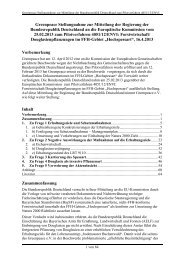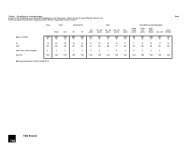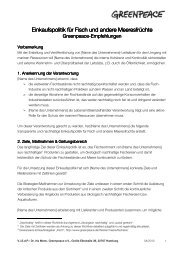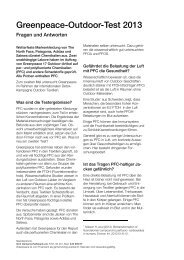SOLAR GENERATION - Greenpeace
SOLAR GENERATION - Greenpeace
SOLAR GENERATION - Greenpeace
You also want an ePaper? Increase the reach of your titles
YUMPU automatically turns print PDFs into web optimized ePapers that Google loves.
PART THREE: THE <strong>SOLAR</strong> RACE<br />
Japan’s national programmes for renewables during 2004<br />
include:<br />
• RPS Law (2003) obliges electric utilities to achieve a target for<br />
1.35% of their electricity supply to come from renewable energy<br />
sources, including solar, by 2010.<br />
• The Regional New Energy Introduction Project aims to accelerate<br />
the introduction of new energy (renewable) technologies by<br />
supporting regional government projects. Half of system<br />
installation costs are subsidised.<br />
• The Subsidy Programme for New Energy Industrialists supports<br />
businesses which plan to introduce new energy, including PV.<br />
• The programme for development of regional new energy visions<br />
helps local government and related bodies to create visions for<br />
facilitating promotion of renewable energy at local levels.<br />
ECONOMICS<br />
Japan has had an aggressive PV R&D programme since the late<br />
1970s, with virtually all funds directed at developing an<br />
industry capable of competing in the world market, and with<br />
cost reductions that would also serve the domestic market.<br />
In the past five years PV system costs have reduced by another<br />
33%. In the future it is expected that the average price of a<br />
residential PV system will fall even further, to below $ 4,000/<br />
kWp. Even so, the cost of PV electricity is still presently more<br />
than twice the price of conventional domestic power, which is<br />
exceptionally expensive in Japan. If the added value of solar<br />
systems in environmental terms was monetised for customers,<br />
however, PV would be able to compete much earlier than<br />
expected.<br />
One other factor is the introduction of premium green pricing<br />
for renewable electricity. All ten Japanese regional power<br />
utilities introduced a “Green Power Fund” at a monthly rate of<br />
$ 1-4 from October 2000, with the companies matching this<br />
amount towards the installation of new renewable plants.<br />
Most electric utilities also have net metering systems by which<br />
they buy PV electricity from individual customers. As a result of<br />
the RPS law, however, some utilities have refused to buy at the<br />
same price level when they cannot use credits from the PV<br />
electricity put into the grid by individual customers for<br />
achieving their respective RPS targets. In these cases, the<br />
purchase price has fallen dramatically to 3-5 cents per kWh.<br />
NATIONAL TARGETS<br />
Following the climate change summit at Kyoto in 1997, Japan<br />
announced (in 2001) an accelerated target to install 4,820 MW<br />
of PV by 2010. Projections by the Japan Photovoltaic Energy<br />
Association (JPEA) show that annual installations could reach<br />
1,230 MWp by 2010, with a corresponding market size of $ 4.5<br />
billion. Looking further ahead, the goal set by JPEA is to increase<br />
the annual market to 4,300 MWp by 2020, with a total capacity<br />
of 28,700 MWp installed. For 2030 the goal is to reach an annual<br />
market of 10,000 MWp, with a cumulative installed capacity of<br />
82,800 MWp. By then the PV industry in Japan would have<br />
created 300,000 jobs, the PV installation rate would be at 45%<br />
for detached houses and the price for a kWp PV system would<br />
have fallen below $ 2,000.<br />
The total future potential for PV power generation in Japan is as<br />
much as 173 GW, according to calculations made by the<br />
government agency METI in 2000.<br />
Prime Power<br />
PV has been installed on a new building at the official residence<br />
of the Japanese Prime Minister, a symbol that solar power is<br />
central to the country’s future energy regime.<br />
28

















